2024届高考英语语法填空考点突破之定语从句课件(共19张PPT)
文档属性
| 名称 | 2024届高考英语语法填空考点突破之定语从句课件(共19张PPT) | 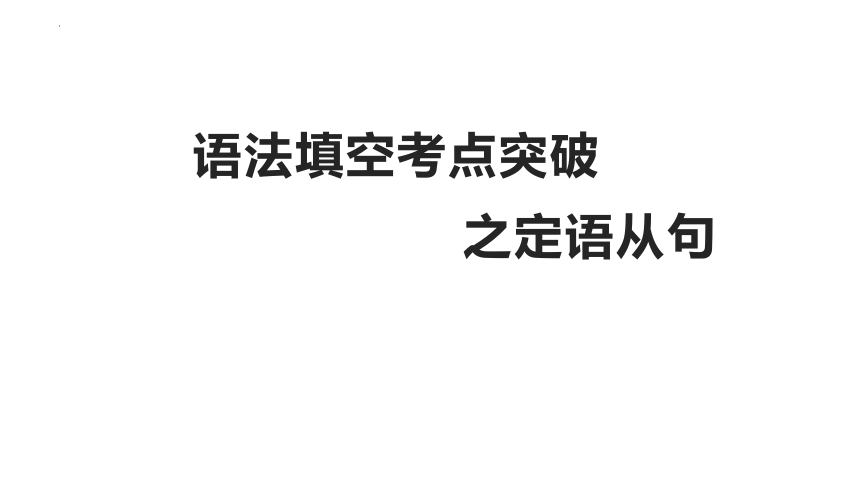 | |
| 格式 | pptx | ||
| 文件大小 | 283.9KB | ||
| 资源类型 | 教案 | ||
| 版本资源 | 通用版 | ||
| 科目 | 英语 | ||
| 更新时间 | 2023-07-28 18:50:09 | ||
图片预览

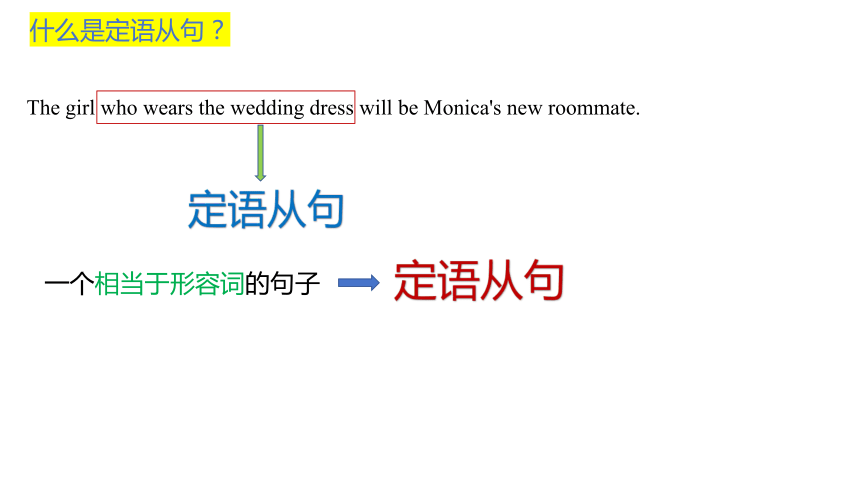
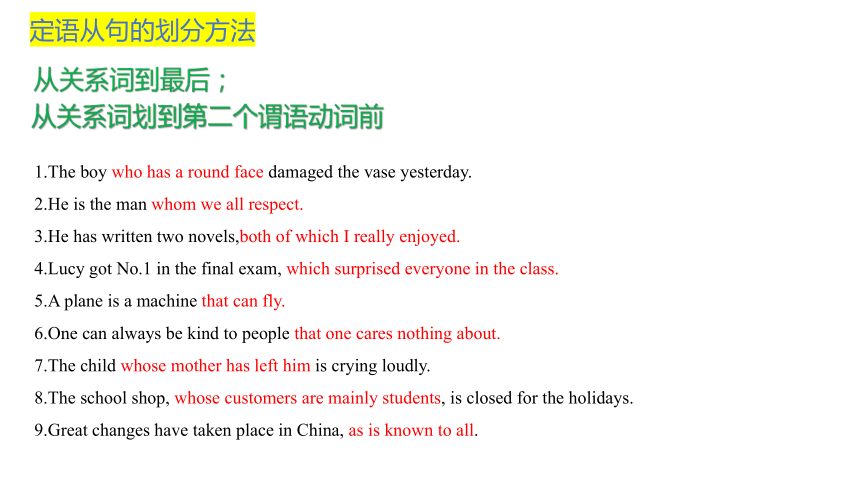
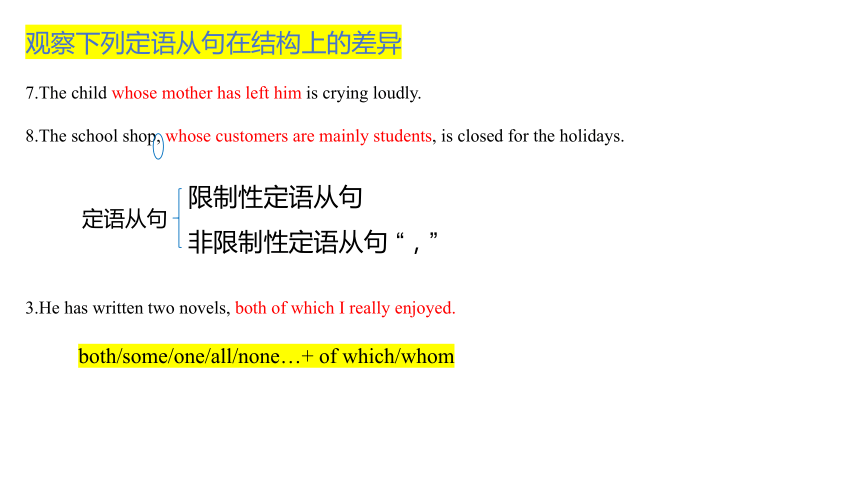
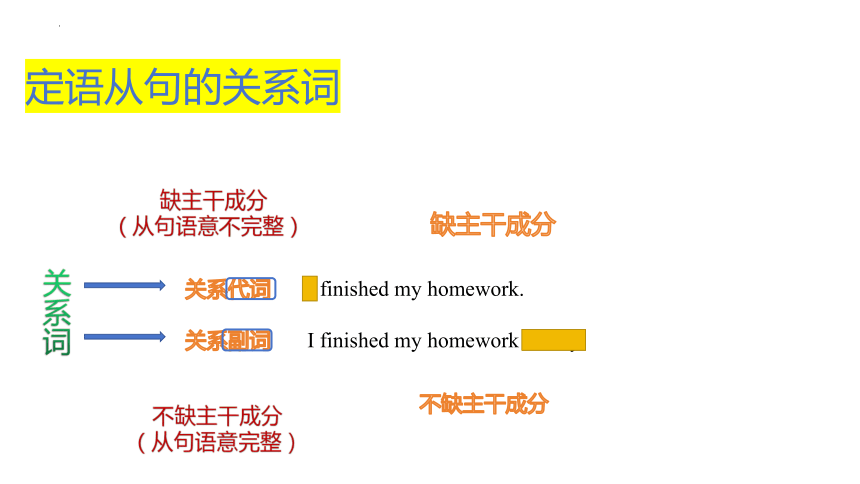
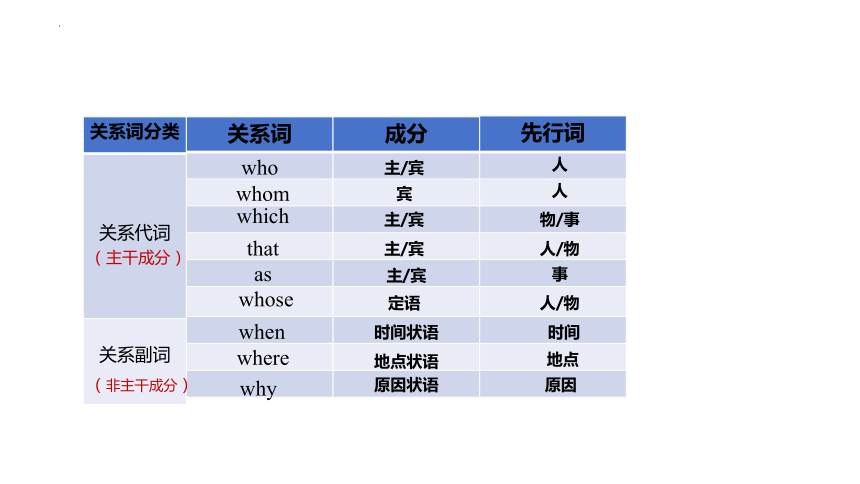
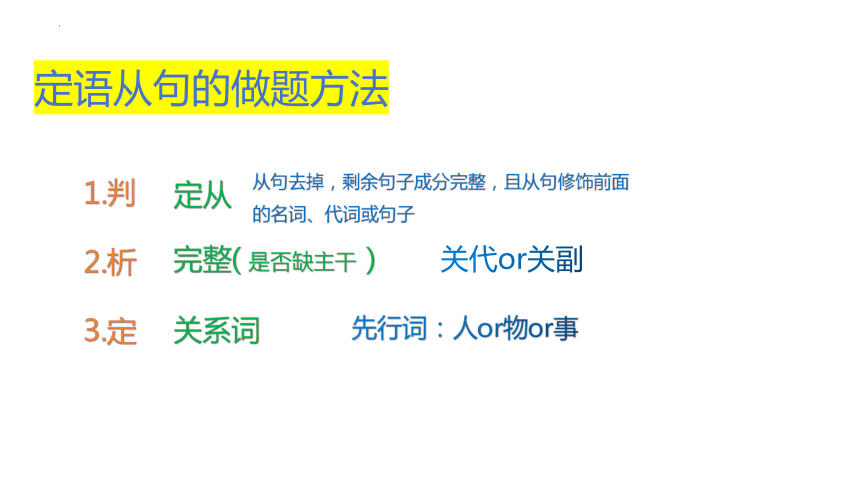
文档简介
(共19张PPT)
语法填空考点突破
之定语从句
The girl who wears the wedding dress will be Monica's new roommate.
定语从句
一个相当于形容词的句子
定语从句
什么是定语从句?
定语从句的划分方法
从关系词到最后;
从关系词划到第二个谓语动词前
1.The boy who has a round face damaged the vase yesterday.
2.He is the man whom we all respect.
3.He has written two novels,both of which I really enjoyed.
4.Lucy got No.1 in the final exam, which surprised everyone in the class.
5.A plane is a machine that can fly.
6.One can always be kind to people that one cares nothing about.
7.The child whose mother has left him is crying loudly.
8.The school shop, whose customers are mainly students, is closed for the holidays.
9.Great changes have taken place in China, as is known to all.
观察下列定语从句在结构上的差异
7.The child whose mother has left him is crying loudly.
8.The school shop, whose customers are mainly students, is closed for the holidays.
3.He has written two novels, both of which I really enjoyed.
both/some/one/all/none…+ of which/whom
定语从句
限制性定语从句
非限制性定语从句 “,”
定语从句的关系词
关系词
缺主干成分
(从句语意不完整)
不缺主干成分
(从句语意完整)
关系代词
关系副词
I finished my homework.
I finished my homework finally.
缺主干成分
不缺主干成分
关系词分类
关系代词
关系副词
关系词
成分
先行词
(主干成分)
(非主干成分)
who
whom
which
that
as
whose
when
where
why
主/宾
宾
主/宾
主/宾
主/宾
定语
时间状语
地点状语
原因状语
人
人
物/事
人/物
事
人/物
时间
地点
原因
定语从句的做题方法
1.判
2.析
3.定
定从
完整( 是否缺主干)
关系词
从句去掉,剩余句子成分完整,且从句修饰前面的名词、代词或句子
关代or关副
先行词:人or物or事
随堂检测
1.The exact year which Angela and her family spent together in China was 2008.
2. They will fly to Washington, where they plan to stay for two or three days.
3.Mrs. Black had such a wonderful time when she visited her friends.
4.The prize will go to the writer whose story shows the most imagination.
5.We live in an age when more information is available with great ease than ever before.
6.A young man, while traveling through a desert, came across a spring of clean water, whose water was sweet.
关系词个性化六大考点
一、指人:
二、指物:
三、指事:
四、指人/物:
五、指地点:
六、介词+关系词
who/whom/that
which/that
which/as
只用that
where
先行词是人:who/whom/that
指人时,做宾语,用who/whom/that
1.Chen Zijiang is a paper-cutting expert who/whom/that I interviewed for my article on Chinese Art.
指人时,做宾语,前有逗号,用who/whom
2.Chen Zijiang is a paper-cutting expert , who/whom I interviewed for my article on Chinese Art.
指人时,前有介词,用whom
3.There,Katia will introduce me to some of her friends, one of whom has been to China several times.
指人时,做主语,先行词是one,ones或anyone时,先行词 为those或被those修饰,用who
4.Happiness and success often come to those who are good at recognizing their own strengths.
先行词是物:which/that
前有介词,只用which不用that
1.The pen which/that you are writing with is Tom's.
The pen with which you are writing is Tom's.
非限定从,只用which不用that
2.It turned out to be her own cup , which she'd left on the shelf by mistake.
先行词是事:which/as
1.Our team won the basketball game, as is expected.
2.Our team, as is expected, won the basketball team.
3.As is expected, our team won the basketball tea1.
4.Our team won the basketball game, which is unexpected.
5.He passed the exam, which made him excited.
句尾
句中
句首
位置差异
1.as从句位置灵活,句首、句中、句尾均可
2.which从句位于先行词之后;
语意差异
1.as有正如的意思,而 which没有
as is often the case这是常有的事
as be done正如……那样
2.which从句内含因果、先后顺序
as在限制性定从中的用法
1.He is such a lazy boy that nobody wants to work with him.
He is such a lazy boy as nobody wants to work with.
such ... that ... 引导的是状语从句,从句是完整的!
such ... as ... 引导定语从句,从句缺主干成分!
2.This is the same computer that I used yesterday. I put a mark on it.
This is the same computer as I used yesterday.They are both black.
the same ... that ... 表示“同一个”
the same ... as ... 表示“同一类”
3. You can take as many candies as you want.
常用于as…as…,such…as…和the same…as…结构中
指人/物:只用that
1.The writer and his novel that are introduced in the article are quite familiar to us.
2.You cannot be sure of something that you might get in the future.
3.All the things that we can do is to give you some advice.
4.This is the most touching story that I have ever read.
5.The first thing that we need to do is to find a hotel.
6.Which is the dress that fits me most
先行词为人+物;
先行词为不定代词;
先行词被限定词所修饰(some,any,much,all,the very,only,序数词或形容词最高级等);
Which引导的疑问句中
抽象地点用where
1.Many countries are setting up national parks where animals and plants can be protected.
2.Sales director is a position where communication ability is very important.
3.I have reached a point in my life where I need to make decisions of my own.
看不见摸不着的地点
常见抽象地点如:position,point,case,stage,condition,activity,relationship,
atmosphere,situation等
抽象地点
介词+关系词
1. The young author has published three novels so far,none of which I really enjoyed.
2. Behind him were other people to whom he was trying to tallk.
3. I wish to thank Professor Smith, without whose help I would never have got this far.
4.We came back on Tuesday, since when we have been working in the repair shop.
5.She climbed up to the top of the hill, from when she could have a good view of the whole town.
关系词:which,whom,whose,when,where
介词的选择
1.根据与先行词搭配的具体意义而定
(1)The year in which the Tangshan earthquake happened was 1976.
Here are the questions, some of which are important for you.
常见形式:some/several/most/all+ of which/whom(of表所属关系)
2.根据固定搭配来确定
(2)I met my primary school tearcher this morning, with whom I have lost touch for almost 20 years.
lose touch with sb 和某人失去联系
随堂检测
1.Gun control is a subject about which Americans have argued for a long time.
2.My friend showed me around the town , which was very kind of him.
3.Wind power is an ancient source of energy to which we may return in the near future.
4. The CEO always tries his best to create an atmosphere where his employees can express their opinions freely.
5.Please send us all the information that you have about the candidate.
5.The air quality in the city, which is shown in the report,
has improved over that past two months.
随堂检测
6.Last month,part of Southeast Asia was struck by floods, from whose effects the people are still suffering.
7.This might explain his interest in fast cars , of which he has a vast collection.
8. I still remember the scientist and his theroy that we learnt yesterday.
9.There are three people in my family and I'm the only one child, which is very common in Chinese families.
语法填空考点突破
之定语从句
The girl who wears the wedding dress will be Monica's new roommate.
定语从句
一个相当于形容词的句子
定语从句
什么是定语从句?
定语从句的划分方法
从关系词到最后;
从关系词划到第二个谓语动词前
1.The boy who has a round face damaged the vase yesterday.
2.He is the man whom we all respect.
3.He has written two novels,both of which I really enjoyed.
4.Lucy got No.1 in the final exam, which surprised everyone in the class.
5.A plane is a machine that can fly.
6.One can always be kind to people that one cares nothing about.
7.The child whose mother has left him is crying loudly.
8.The school shop, whose customers are mainly students, is closed for the holidays.
9.Great changes have taken place in China, as is known to all.
观察下列定语从句在结构上的差异
7.The child whose mother has left him is crying loudly.
8.The school shop, whose customers are mainly students, is closed for the holidays.
3.He has written two novels, both of which I really enjoyed.
both/some/one/all/none…+ of which/whom
定语从句
限制性定语从句
非限制性定语从句 “,”
定语从句的关系词
关系词
缺主干成分
(从句语意不完整)
不缺主干成分
(从句语意完整)
关系代词
关系副词
I finished my homework.
I finished my homework finally.
缺主干成分
不缺主干成分
关系词分类
关系代词
关系副词
关系词
成分
先行词
(主干成分)
(非主干成分)
who
whom
which
that
as
whose
when
where
why
主/宾
宾
主/宾
主/宾
主/宾
定语
时间状语
地点状语
原因状语
人
人
物/事
人/物
事
人/物
时间
地点
原因
定语从句的做题方法
1.判
2.析
3.定
定从
完整( 是否缺主干)
关系词
从句去掉,剩余句子成分完整,且从句修饰前面的名词、代词或句子
关代or关副
先行词:人or物or事
随堂检测
1.The exact year which Angela and her family spent together in China was 2008.
2. They will fly to Washington, where they plan to stay for two or three days.
3.Mrs. Black had such a wonderful time when she visited her friends.
4.The prize will go to the writer whose story shows the most imagination.
5.We live in an age when more information is available with great ease than ever before.
6.A young man, while traveling through a desert, came across a spring of clean water, whose water was sweet.
关系词个性化六大考点
一、指人:
二、指物:
三、指事:
四、指人/物:
五、指地点:
六、介词+关系词
who/whom/that
which/that
which/as
只用that
where
先行词是人:who/whom/that
指人时,做宾语,用who/whom/that
1.Chen Zijiang is a paper-cutting expert who/whom/that I interviewed for my article on Chinese Art.
指人时,做宾语,前有逗号,用who/whom
2.Chen Zijiang is a paper-cutting expert , who/whom I interviewed for my article on Chinese Art.
指人时,前有介词,用whom
3.There,Katia will introduce me to some of her friends, one of whom has been to China several times.
指人时,做主语,先行词是one,ones或anyone时,先行词 为those或被those修饰,用who
4.Happiness and success often come to those who are good at recognizing their own strengths.
先行词是物:which/that
前有介词,只用which不用that
1.The pen which/that you are writing with is Tom's.
The pen with which you are writing is Tom's.
非限定从,只用which不用that
2.It turned out to be her own cup , which she'd left on the shelf by mistake.
先行词是事:which/as
1.Our team won the basketball game, as is expected.
2.Our team, as is expected, won the basketball team.
3.As is expected, our team won the basketball tea1.
4.Our team won the basketball game, which is unexpected.
5.He passed the exam, which made him excited.
句尾
句中
句首
位置差异
1.as从句位置灵活,句首、句中、句尾均可
2.which从句位于先行词之后;
语意差异
1.as有正如的意思,而 which没有
as is often the case这是常有的事
as be done正如……那样
2.which从句内含因果、先后顺序
as在限制性定从中的用法
1.He is such a lazy boy that nobody wants to work with him.
He is such a lazy boy as nobody wants to work with.
such ... that ... 引导的是状语从句,从句是完整的!
such ... as ... 引导定语从句,从句缺主干成分!
2.This is the same computer that I used yesterday. I put a mark on it.
This is the same computer as I used yesterday.They are both black.
the same ... that ... 表示“同一个”
the same ... as ... 表示“同一类”
3. You can take as many candies as you want.
常用于as…as…,such…as…和the same…as…结构中
指人/物:只用that
1.The writer and his novel that are introduced in the article are quite familiar to us.
2.You cannot be sure of something that you might get in the future.
3.All the things that we can do is to give you some advice.
4.This is the most touching story that I have ever read.
5.The first thing that we need to do is to find a hotel.
6.Which is the dress that fits me most
先行词为人+物;
先行词为不定代词;
先行词被限定词所修饰(some,any,much,all,the very,only,序数词或形容词最高级等);
Which引导的疑问句中
抽象地点用where
1.Many countries are setting up national parks where animals and plants can be protected.
2.Sales director is a position where communication ability is very important.
3.I have reached a point in my life where I need to make decisions of my own.
看不见摸不着的地点
常见抽象地点如:position,point,case,stage,condition,activity,relationship,
atmosphere,situation等
抽象地点
介词+关系词
1. The young author has published three novels so far,none of which I really enjoyed.
2. Behind him were other people to whom he was trying to tallk.
3. I wish to thank Professor Smith, without whose help I would never have got this far.
4.We came back on Tuesday, since when we have been working in the repair shop.
5.She climbed up to the top of the hill, from when she could have a good view of the whole town.
关系词:which,whom,whose,when,where
介词的选择
1.根据与先行词搭配的具体意义而定
(1)The year in which the Tangshan earthquake happened was 1976.
Here are the questions, some of which are important for you.
常见形式:some/several/most/all+ of which/whom(of表所属关系)
2.根据固定搭配来确定
(2)I met my primary school tearcher this morning, with whom I have lost touch for almost 20 years.
lose touch with sb 和某人失去联系
随堂检测
1.Gun control is a subject about which Americans have argued for a long time.
2.My friend showed me around the town , which was very kind of him.
3.Wind power is an ancient source of energy to which we may return in the near future.
4. The CEO always tries his best to create an atmosphere where his employees can express their opinions freely.
5.Please send us all the information that you have about the candidate.
5.The air quality in the city, which is shown in the report,
has improved over that past two months.
随堂检测
6.Last month,part of Southeast Asia was struck by floods, from whose effects the people are still suffering.
7.This might explain his interest in fast cars , of which he has a vast collection.
8. I still remember the scientist and his theroy that we learnt yesterday.
9.There are three people in my family and I'm the only one child, which is very common in Chinese families.
